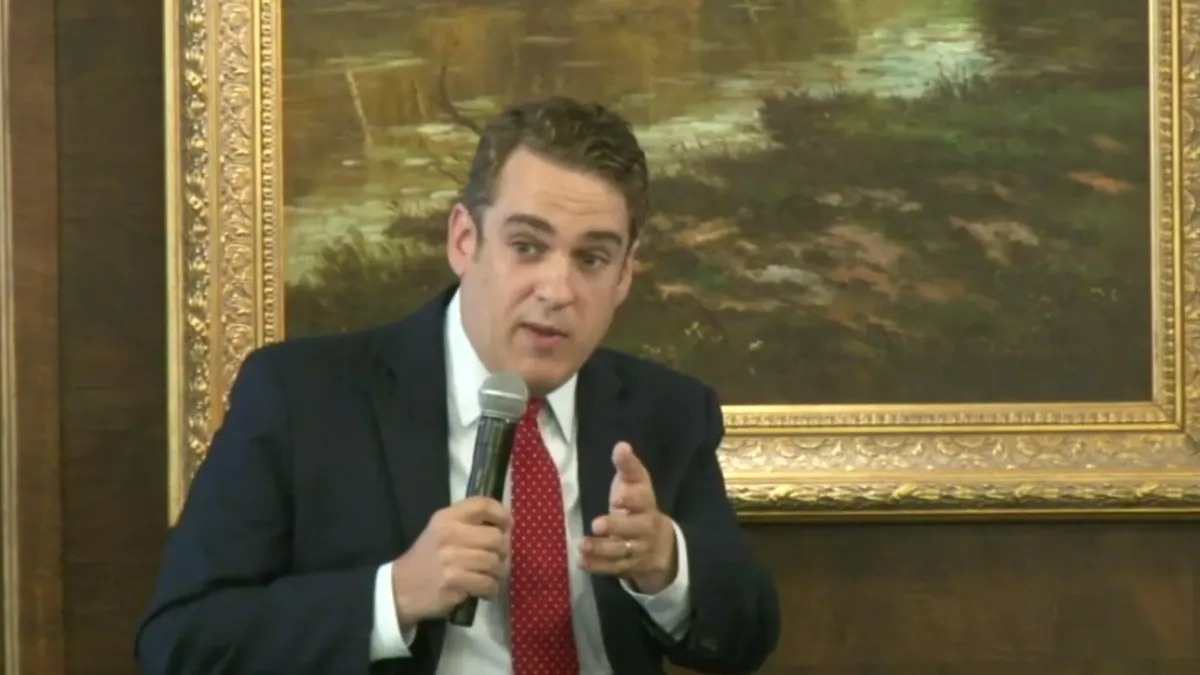Dive Brief:
- It’s unlikely the Federal Energy Regulatory Commission will be able to show that existing transmission rates are unjust, a finding that would be needed to approve a pending proposed transmission planning and cost allocation rule, according to FERC Commissioner James Danly.
- At its core, FERC’s “coercive” proposal gives a preference to states and localities with renewable portfolio standards, and forces other states into planning for those policy choices, Danly said Thursday at a meeting held by WIRES, a trade group for utilities, grid operators and other companies in the transmission sector.
- “Accommodating idiosyncratic public policies is not within the remit of FERC,” Danly said, adding that the agency should focus on transmission projects that improve reliability and reduce costs.
Dive Insight:
Danly, the only FERC commissioner voting against the agency’s proposed rule, told the WIRES audience he had two main problems with the plan.
First, he said he doubted FERC would be able to assemble the evidence it needs under the Federal Power Act to change its transmission planning and cost allocation rules.
FERC must show there are systemically unjust transmission rates that need to be fixed by universal action, according to Danly.
Second, the proposed rule discriminates in favor of states that have renewable portfolio standards, according to Danly.
“It bakes in from the get-go … considerations of specific types of state policies, and then creates a mechanism that sort of presupposes the conclusion that you're going to arrive at, which is that all of the transmission plan has to achieve those goals,” Danly said.
Also, Danly said it is hard to justify sweeping changes when regions with vertically integrated utilities have low transmission rates.
“Why would it be that certain regions, in certain parts of the country, like the Southeast, have remarkably low transmission rates and other areas, especially those that seem to have an awful lot of oversight from the federal government — I can think of particular RTOs ... — have very high transmission rates?” Danly asked.
Danly said he was surprised his fellow commissioners decided to include the contentious issue of “right of first refusal” in the proposal. Utilities want to have a ROFR for transmission projects, which would give them the option of building them, while competitive transmission developers, consumer advocates and others oppose it.
“You can see this really causing an awful lot of problems in an already complicated subject,” Danly said.
The idea that competition will lower transmission rates is an “appealing” theory, but may not hold up in the transmission sector, according to Danly.
Danly said he would have thought if the benefits of competition were so obvious, “there would have been a whole lot more of it, a whole lot faster.”
When asked about reforming the generator interconnection process, an issue that wasn’t part of FERC’s proposal, Danly noted all five FERC commissioners have said they are concerned about the issue.
“I don't think there's anybody who thinks, anywhere, that the interconnection process is working smoothly,” Danly said.
However, there’s no successful model for grid interconnection that could be copied, according to Danly. Interconnection reform will likely be an iterative process, involving repeated reform efforts: “Learning and then tightening things up or boosting them as necessary.”
Danly said he was not in favor of broadly sharing generator interconnection costs. “I think that that creates a whole set of incentives that are very problematic,” he said.
FERC’s policy for deciding how much return on equity transmission owners should receive has created uncertainty that is hurting transmission development, according to Danly.
“Every time the commission seems to lurch in one general direction or another, higher and lower [ROE,] that adds yet another layer of uncertainty to the entire undertaking,” Danly said. “I really think that stability and predictability are critical … especially given the mishmash that we've created so far. Any drastic departure from even the less than optimal setup that we have now should be undertaken with a great deal of deliberation because we risk even further confusing things.”
Danly slammed FERC’s decision to launch a notice of inquiry examining accounting practices for trade association dues, saying it was sparked by a “cynical” petition.
“FERC's rules are absolutely sufficient for the problem, and if there is an identifiable abuse of them, there are mechanisms by which to remedy it,” Danly said. “The thought that we would somehow ever in our wildest dreams think that it would be appropriate for us to start delving into what speech and how is appropriate is insane to me."















